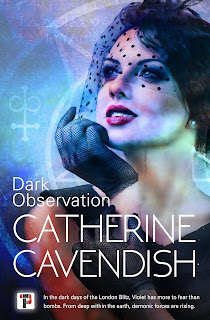My new novel, Dark Observation, centres on the occult and contains references to some sinister beliefs that found favour with the Nazis during some of the darkest days of the twentieth century. Indeed it could be said to be cursed with the horrors its walls have witnessed.
The
unique and imposing triangular Wewelsburg Castle built in Renaissance style
between 1603 and 1609 was intended originally as a residence for the Prince
Bishops of Paderborn in Germany. It stands high on a rock with views over the
Alme Valley and can be found in the village of Büren.
Following
its initial purpose, the castle changed hands a number of times until, in 1933,
Hitler’s right-hand man, Heinrich Himmler, signed a 100-year lease for it at a
nominal rent of one mark per year. He saw, despite its much decayed state,
potential as a training ground for the soon to be infamous Schutzstaffel (SS), of
which he was the commander.
Himmler, in common with a number of leading Nazis, including Hitler himself, was obsessed with old Germanic and Norse myth and legend as well as occult rituals with their roots firmly planted in the sort of Dark Arts that had so bewitched Aleister Crowley among others. In Himmler’s eyes, Wewelsburg was the perfect place to indoctrinate SS soldiers with these heinous beliefs.
To Himmler, Wewelsburg was the Grail Castle. He believed that once the Nazis had conquered the world, establishing the Aryan reign that would last a thousand years, artifacts accumulated in the castle as well as the building itself would radiate magical powers.
Included among these trophies was to be
the Spear of Destiny, prized by Hitler as having shown him his future when he
saw it on display at the Hofburg museum in Vienna. Himmler slept with a replica
of it in his bedroom and was obsessed with acquiring as many of the actual holy
relics as possible.
 |
| pictured: Himmler (left) Heydrich (centre) |
Work began on restoring the Castle and moulding it into a centre of the universe for all Aryans. This included constructing a magnificent marble altar with the letters ‘SS’ engraved on it. A former cistern was turned into a crypt for ritual purposes where it was intended that the ashes of the most senior SS leaders would be buried and venerated, with an eternal flame burning to act as a focal point.
Baptismal activities took place here – the children involved being products of the Lebensborn breeding programme designed to perpetuate the pure Aryan race. Himmler also intended to replace Christmas with a winter solstice festival based on ancient pagan ritual to supplement the main midsummer solstice which he also sought to establish. Elsewhere, a round table with twelve chairs, reminiscent of the mythical King Arthur and his knights, was also built.
 |
| Edward Bulwer Lytton |
All in all, ‘Dark Camelot,’ as many in the Nazi Party came to refer to Wewelsburg, was to become a cathedral where senior ‘priests’ met to engage in worship of the dark and mythological world in which Edward Bulwer Lytton’s fictional work, The Coming Race, with its depiction of an alien super race dwelling deep within the earth, was accepted as fact. Those who worshipped at Wewelsburg were true believers in the most evil of fantasies and millions of innocent men, women and children would pay the price.
SS
soldiers were carefully picked. They had to look a certain way and be malleable
enough to be persuaded to believe what their leaders wanted them to believe.
Not only that, they would be desensitized to such a degree that they could not
only bear incredible suffering themselves, but also be totally oblivious to the
suffering they inflicted on others. It was brainwashing with no room for
conscience or compassion. Much of this happened at Wewelsburg, secluded enough
to prevent prying eyes or unwanted leaks of information.
Himmler’s
plans never reached completion although the renovation continued for twelve
years under SS control. His ideas grew ever more grandiose including plans to
create a circular fortification around the hill on which the castle stood which
would have resulted in the eviction of the entire surrounding town, as well as
flooding the whole valley around Wewelsburg.
 |
| SS Generals' Hall, Wewelsburg |
These
days, Wewelsburg is restored and open as a museum. But what secrets do its ancient
walls retain? Relics and artifacts from Himmler’s time there are on show,
amongst much else from the castle’s long history. It has been said that
Wewelsburg shows more clearly than probably anywhere, how steeped in the occult
the Nazi leadership became, and how dependent upon it they were in the
realization of their vile dreams.
“A dark, disturbing thrill ride” – Publishers’ Weekly
"An engaging, multigenerational tale of dark magic and occult" - Booklist
“A wonderful eerie piece of historical horror” - Runalongwomble
“Drawing on magical realism and giving it a more nefarious angle, and then taking it one step further” – Cheryl M-M’s Blogspot
Eligos is waiting…fulfil your destiny
1941. In the dark days of war-torn London, Violet works in Churchill's subterranean top secret Cabinet War Rooms, where key decisions that will dictate Britain’s conduct of the war are made. Above, the people of London go about their daily business as best they can, unaware of the life that teems beneath their feet.
Night after night the bombs rain down, yet Violet has far more to fear than air raids. A mysterious man, a room only she can see, memories she can no longer trust, and a best friend who denies their shared past... Something or someone - is targeting her.
Simon and Schuster
Amazon
Barnes and Noble
Waterstones
Bookshop.org (where you can support your favourite local bookshop)
and at good bookshops everywhere (on the shelf or to order)
Images:
Shutterstock
Nik Keevil and
Flame Tree Studio
Author's own









